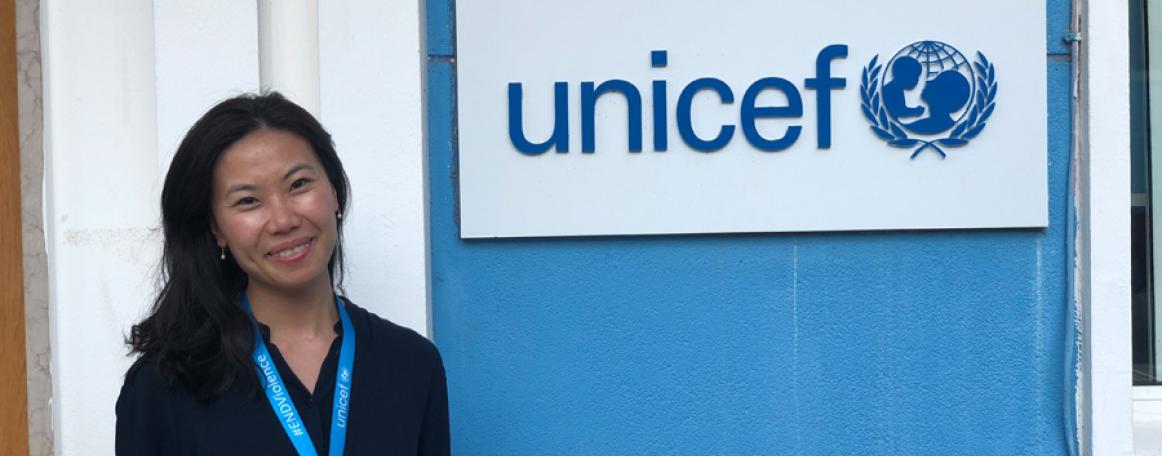Anyone who’s faced the prospect of a career change – or several – knows a good measure of self-doubt often comes along for the ride.
For Lisa Qin, changing course – from law to teaching to international development – has seen the 33-year-old adopt a regular practice of questioning her path and reviewing her choices. It’s something, she said, that’s helped her navigate her way through the changes in her career.
“I’ve learned how to trust my instincts a bit more, rather than be driven by other people’s expectations of what I should be doing,” she said.
“But learning how to trust myself has come from difficult experiences.
“It’s those times when you’re in a law firm at 2am wondering, ‘is this really right for me’? Or teaching at a difficult school after a really hard class and slouching against the wall thinking, ‘oh my gosh, what am I doing’? It’s those kinds of circumstances which make you ask, ‘what’s really in my heart? What’s driving me?’”
A passion for education and a strong pull back to her country of birth led Qin to her work as an education officer with Unicef in China, a role she’s held for the past four years.
“China has 271 million children, which is astounding, and within that number four out of ten of those children are affected by migration,” she said.
“That means they’re either living in rural areas and their parents are working in cities, or they’ve migrated to urban areas with their parents.”
Qin and her team in the education and child development section work with the Ministry of Education and partners on pilot interventions that aim to help improve the quality of education in rural and poverty-stricken areas, and improve learning conditions among vulnerable and disadvantaged children.
“Impact takes time,” she said.
“But even in the four years I’ve been there, there have been huge improvements. When I first started, the kindergarten enrolment rate was 65 per cent and now it’s 75 per cent. That’s actually a big shift, because in cities like Beijing and Shanghai pretty much all the children were already going to preschool, so the improvement is actually in the rural areas.”
The desire to address inequities in education has deep roots for Qin (Master of Teaching (Secondary) 2013), who was born in Guizhou, a province in China’s south-west.
“I was born in the poorest province of China – Unicef still has a lot of programs there – and it just didn’t make sense to me that a girl who is in that province now, because she doesn’t have a good education and because she doesn’t have the opportunities that I did, has such a different life trajectory to me.”
Qin’s own life changed course after her father received a scholarship to study at Australian National University, which saw the family uproot their lives in China and resettle in Canberra.
Qin would later attend that same university to study a Bachelor of Laws and Bachelor of Commerce. She went on to do a Master of Teaching at the University of Melbourne through the Teach For Australia program, and, capping off her formal studies, a Master of Education at the Harvard Graduate School of Education in the US, for which she won the Frank Knox Fellowship.
It’s an impressive resume that could suggest someone who’s had lofty goals from the start. Not so, Qin said.
“I didn’t even know what the UN was as a kid, or Harvard, or anything like that. My parents were immigrants – I grew up in government housing, they had to work as cleaners and kitchenhands to support my father’s studies.”
But she does suggest a call to education may have been on the cards early on.
“I do recall my mother saying that when I was young I would play with my toys and I’d put them out in front of me and ‘teach’ them, so I guess there was always something in me that wanted to share and learn and teach,” she said.
“School was a safe place for me to learn and an experience I cherished. It gave me so many possibilities to grow. And despite all the challenges we face in education today, the classroom still gives me hope.”
By Lani Thorpe
Lisa Qin won the 2018 Young Australia China Alumni of the Year award, presented by the Australia China Alumni Association to recognise the achievements and contributions of graduates of Australian universities currently working within the Australia-China community.
